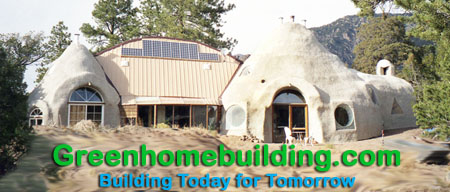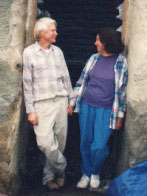
Education about Natural Building
 Dan Chiras has been involved in natural and alternative building since 1994 and lives in an off-grid passive solar/solar electric home in the foothills of the Rockies. His house is built from straw bales, rammed earth tires, and numerous green building materials and is powered entirely by wind and solar energy. Dan is author of The Natural House: A Complete Guide to Healthy, Energy-Efficient, Environmental Homes, published by Chelsea Green; and numerous articles on natural building and sustainable design, which have appeared in Mother Earth News, Natural Home, and The Last Straw. Dan embraces a comprehensive systems approach to building that offers a wide range of benefits to people, the planet, and our economy. He will field general questions on natural building and offers consultation on project design and construction, as well as lectures and workshops on various aspects of natural and sustainable design and construction.
Dan Chiras has been involved in natural and alternative building since 1994 and lives in an off-grid passive solar/solar electric home in the foothills of the Rockies. His house is built from straw bales, rammed earth tires, and numerous green building materials and is powered entirely by wind and solar energy. Dan is author of The Natural House: A Complete Guide to Healthy, Energy-Efficient, Environmental Homes, published by Chelsea Green; and numerous articles on natural building and sustainable design, which have appeared in Mother Earth News, Natural Home, and The Last Straw. Dan embraces a comprehensive systems approach to building that offers a wide range of benefits to people, the planet, and our economy. He will field general questions on natural building and offers consultation on project design and construction, as well as lectures and workshops on various aspects of natural and sustainable design and construction.
Questions and Answers
Q: I have had an interest in natural structures for awhile now and hope to someday build a place of my own. I hope to be returning to graduate school next fall and am interested in how one becomes involved in the filed of sustainable architecture. Are there certain programs for such things? Can I attend a conventional design or architecture program, or should I study some aspect of ecology? Can you give me any indication of how to get involved in this field? Thank you.
A: I talked with an architect today and he gave me some possible leads on sustainable architecture. You should check out the University of Virginia where William McDonough is now acting as chair of the department (he thinks). You should also check out the University of Arizona School of Architecture. They have a strong solar program, but my friend wasn't sure about sustainable design. You should also check out the University of Oregon School of Architecture. He'd heard rumor that they might have some sustainable design work going on there.
Q: I am interested in a career in the green building industry. I'm most interested in alternative and natural home building. How can I get started, and who might I contact to find out more about a career in this field. Any advice would be very much appreciated.
A: (Kelly) My first suggestion would be to gain some insight through study and or hands-on workshop experience. My news page lists lots of hands on workshops being offered around the country. www.ecosainstitute.org ECOSA offers a 3 month immersion program in Ecological Design/Architecture that may be worth up to 15 credit hours with an articulation agreement between schools.
Q: My name is Raechel, and I am 19 yrs. old. My family lives in western PA, in a pre-civil war farm house. The house we live in is finally starting to come apart. Mom and I want to build a house out of natural materials. I am not sure that this is very feasible thing for two women to undertake, but my Dad is a construction worker and does not have the time or money to build a new house. If you could send me some advise of how to start, and the type of things to use, I would greatly appreciate it.
A: Building your own house out of natural materials, especially with help from you dad, is imminently "doable." Where to start? At the risk of sounding like a commercial, I'd strongly recommend that you read my book, The Natural House: A Guide to Healthy, Energy-Efficient, Environmental Homes. This book surveys 14 natural building materials, giving the pros and cons of each. In the process, you will learn a great deal about building. The book also covers energy and water systems, and a host of other considerations vital to building a home that has minimal impact on the environment during construction and during its long life span. The book has an extensive resource guide that can be very helpful in locating further information.You can also check out my web site at www.chelseagreen.com/Chiras (be sure to capitalize the C in my last name or it won't let you in). The web site contains a wealth of information, including workshops that might be helpful to you and your parents.
Q: I'm writing from Taiwan and I am looking for an internship opportunity which will be sponsored by foreign ministry of Taiwan staring from august for two to four months. I heard about you organization through a friend who highly recommended it. I am an architect with a few community experiences and a branch leader of society of wilderness (S.O.W) Taiwan as volunteer and I like working with dirt a lot. Also, my English is neither too good nor too bad. For the internship, my major interest is in natural building, secondly in permaculture. Is it possible that you give me some advise on proper programs or instruct me on how to organize a two to four months' internship aiming at having a complete vision on natural building (primarily), permaculture and ecovillage? If so ,can you send me some info about it? And finally, my internship application will need a consent letter from the organization accepting me.
A: The only internship that I know about personally is through the Lama Foundation in northern New Mexico. They offer a 9-day workshop called "Build Here Now" in June, which would be an excellent place to start. (Maybe you could start a little earlier than you had planned?) During this event many natural builders come to the Foundation to teach a variety of different natural building techniques like straw bale, straw clay, earthen plasters, and so on. After the event is over, interns stay on to complete projects. You won't learn all of the natural building techniques during the workshop, but you will be exposed to a number of them. You can contact the Lama Foundation by searching their name on the Internet and then sending an inquiry directly to them.
You might also like to contact the folks at The Last Straw, a journal of strawbale and natural building and see if they have any ideas for you. Their email is thelaststrawATthelaststraw.org.
C: Thank you very much for replying so fast. I recalled having visiting Lama Foundation's website but didn't read carefully. I will check again. Meanwhile I found on Emerald Earth Sanctuary's web a two week's intensive course and opportunity of work exchange. I might try to contact them too.
A: You might want to try the folks at Cob Cottage Company. They offer internships, although their focus is almost entirely on cob construction. I know you were looking for an internship that offered more. Another thought came to mind after I e-mailed you yesterday. The Solar Living Institute in Hopland, California (about 90 miles north of San Francisco) also offers internships. They don't do much natural building, but they are a permaculture site and interns can sign up for free for the weekend workshops on solar energy and natural building that are taught through SLI.
Q: I am an architecture student who will be entering an M.Arch program in the fall. I've been accepted into M.I.T and the University of Toronto. I intend to make my focus, and my career, one working in the field of sustainable architecture. I would appreciate any advice you can give on which of these two schools have the greatest focus in this field.
A: Congratulations on your acceptance into two fine school. Unfortunately, I'm not familiar with the curricula and faculty of either Institution to give you a learned response. You'd probably be best to scour the course offerings and visit both schools to talk to the faculty.
Q: I'm at the very beginning of my research but I would like to study about earthen products and their positive - negative effects on human health in different regions of Turkey. Do you think as an expert in this field, would it be a good starting point or should I move to an other perspective?
A: I do not know your academic background, but it seems to me that a health effects study of natural building could be quite difficult for a graduate student. If you are in a health profession, perhaps this would be a good idea. If not, the study could be quite difficult. In addition, I haven't heard much about health effects of natural building materials, so you may end up finding nothing... You might want to consider studying the energy performance and/or comfort of homes built from different types of natural materials or even the cost of building the same home using different materials. This is information that's not available and that a lot of people would like to know how various natural homes perform and how much they cost to build.
Q: My husband and I own a construction company in Winchester, VA and are interested in building green homes. We have done a few jobs with S.I.P.S and want to know if there are any certifications out to help better educate us on various ways to build green. Where do we start in the whole building green process? How do we integrate green with conventional building? I just spoke with a representative from USGBC in Washington DC and their LEED certification is only for commercial building. We are still planning on taking this course to educate for our commercial building division.
A: The University of Colorado in Boulder, CO offers a sustainable building certification program, which they started this year. I taught the green building course -- a three-day introduction to green building and may offer it again next summer in a slightly longer format. If all goes well, it will be a four or five day intensive course on green building. To receive a certificate from CU, I believe you have to take four courses, which are still under development. You can find out more by contacting their continuing education program.
The USGBC is now offering LEED certification for homes, but they don't have a training course for this as yet, as the program is still in the pilot phase. You can learn an awful lot about green building by attending their annual conference. This year it is being held in Chicago in November, I believe.
Several nonprofit organizations also offer courses in renewable energy (which is part of green building) and green building. You might check out the Midwest Renewable Energy Association's workshops, as well as workshops offered by Solar Energy International (in CO) and the Solar Living Institute (in CA).
Finally, this may sound a bit self-serving, but the fastest way to learn a lot is to read some books on the subject. I've got three books that should be of great assistance, The New Ecological Home, The Solar House, and The Homeowner's Guide to Renewable Energy. These three books will bring you up to speed very fast and cover a lot more information than you'll get in a three or four-day course.
Q: I am planning a trip to New Mexico in September and would like to tour some homes. Is there a way to find owners, builders that don't mind people coming to look and learn about what is available and how it works.
A: (Kelly) It is not always easy to find homes to tour, but here are some possible ways to find them: Go to http://nbnetwork.org/directory and do a search on "new mexico" and several will turn up. Zoom in on the map at http://naturalhomes.org/naturalhomesmap.htm to new mexico, and click on the various places that are pointed out, and information about the house and owner will come up.


